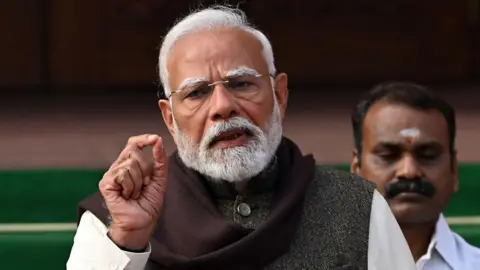Carney invites Modi to G7, signalling thaw in relations
 Getty Images
Getty ImagesMark Carney has invited his Indian counterpart Narendra Modi to the upcoming G7 summit in Alberta, marking a shift in Canada-India relations that had soured in recent years.
The two spoke over the phone on Friday, during which the Canadian prime minister extended the invite to Modi and agreed to stay in contact, according to a readout released by Carney's office.
Modi confirmed the invite and thanked Carney in a post on X, adding that he looked forward to meeting him at the summit in mid-June.
Relations between the two countries have been strained since former PM Justin Trudeau accused India of carrying out the killing of a Sikh separatist leader on Canadian soil.
Hardeep Singh Nijjar was shot and killed outside a Sikh temple he led in Surrey, British Columbia in June 2023.
He had been a vocal advocate for the creation of a separate state for Sikhs in India, called Khalistan. India has accused him of being a terrorist and of leading a militant separatist group - accusations his supporters call "unfounded".
Four Indian nationals have since been arrested and charged in connection to Mr Nijjar's death.
Trudeau alleged that agents of the Indian government were involved in the killing, while the Royal Canadian Mounted Police (RCMP) said it had strong evidence that India was involved in orchestrating campaigns of violence and extortion on Canadian soil.
India strongly rejected the allegations, calling them "preposterous", and the row led both Canada and India to expel their top envoys along with other diplomats.
Carney defended his decision to invite Modi despite the allegations while speaking to reporters on Friday.
While India is not a member of the G7, Modi has attended meetings at previous summits. Carney, who is chairing this year's G7 summit, said key discussions will be held that "certain countries" should be at the table for.
The readout said Carney and Modi agreed to "continued law enforcement dialogue and discussions addressing security concerns" surrounding the allegations.
Asked if he believed Modi was involved in the killing of Mr Nijjar, Carney said it was not appropriate to comment on an ongoing legal case.
The decision to invite Modi was condemned by some members of Canada's Sikh community.
The World Sikh Organisation called it a "betrayal of Sikh Canadians" in a statment, while the Sikh Federation of Canada called it "a grave insult".
Mr Nijjar was prominent in British Columbia's Sikh community. Supporters of his have said that he was the target of threats in the past because of his activism over Khalistan.
A trial date has not yet been set for the four men accused of killing Mr Nijjar.
The G7 summit is set to take place between 15 and 17 June in Kananaskis, Alberta. Topics on the agenda, according to the summit's website, include "international peace and security," "global economic stability," and the "digital transition".
Alongside India, Carney has also extended an invite to Mexico's President Claudia Sheinbaum - though she said in late May that she was undecided on whether to attend.
Ukraine's Volodymyr Zelensky and Australian Prime Minister Anthony Albanese will attend.
A full list of invitees has not yet been released.
